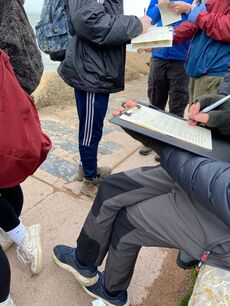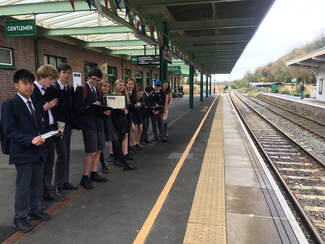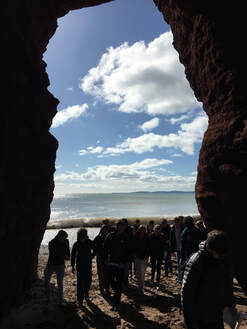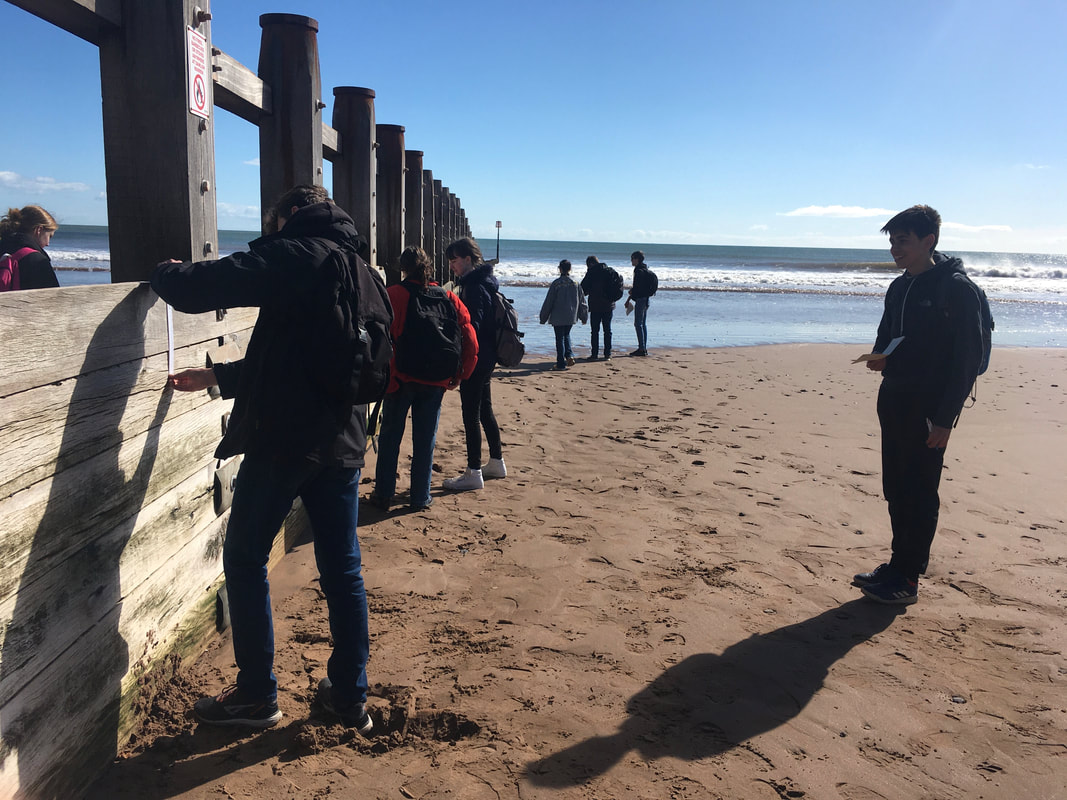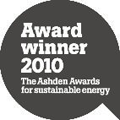Geography
Vision:
The Geography Team at Okehampton develop curious, independent and driven citizens of the world. Our geographers are nurtured to question right from wrong, are encouraged to have inquisitive minds and are given the skills to succeed in a multitude of disciplines in the future.
We actively challenge and encourage our students to decipher fact from fiction, fake news from real news and how their own actions, and those of others, contribute to the world around them - at a local, national and global scale. Okehampton geographers are inspired to want to make the world a better place.
Geography is a unique subject that investigates the human and physical worlds and crucially teaches the links between them.
The study of geography is crucial for us to live sustainably in a rapidly changing world. We strive to keep it relevant and engaging; equipping our geographers with a powerful set of knowledge, skills and the vocabulary needed for an abundance of geographical careers.
The Geography Team at Okehampton develop curious, independent and driven citizens of the world. Our geographers are nurtured to question right from wrong, are encouraged to have inquisitive minds and are given the skills to succeed in a multitude of disciplines in the future.
We actively challenge and encourage our students to decipher fact from fiction, fake news from real news and how their own actions, and those of others, contribute to the world around them - at a local, national and global scale. Okehampton geographers are inspired to want to make the world a better place.
Geography is a unique subject that investigates the human and physical worlds and crucially teaches the links between them.
The study of geography is crucial for us to live sustainably in a rapidly changing world. We strive to keep it relevant and engaging; equipping our geographers with a powerful set of knowledge, skills and the vocabulary needed for an abundance of geographical careers.
In Key Stage 3 students receive 1 hour of geography per week in a spiral curriculum, that sets them up with a sound knowledge base for GCSE.
Our very popular GCSE course follows the OCR B syllabus and is taught across 2.5 hours per week. We currently have 5 classes of GCSE students in both Year 10 and Year 11, with around 140 students per year, making geography the most popular optional subject.
At A level we offer two options: Geography and Sociology.
Our very popular GCSE course follows the OCR B syllabus and is taught across 2.5 hours per week. We currently have 5 classes of GCSE students in both Year 10 and Year 11, with around 140 students per year, making geography the most popular optional subject.
At A level we offer two options: Geography and Sociology.
|
Fieldtrips:
Geography is a subject that should be taught ‘in the field’. We strongly feel that all students should be offered opportunities to widen their horizons and are working to develop additional trips to those we currently offer:
|
Assessment:
In Key Stage 3, students are assessed at the end of each unit, typically five times per year. The assessments take the form of multiple-choice questions alongside some longer exam-style questions.
Feedback is highly valued within the Humanities Faculty. Following each assessment, results will be given with a dedicated lesson providing in-depth feedback so that students can reflect, improve their knowledge, skills and confidence in completing assessments.
Results of these assessments are sent home to parents/guardians three times per year.
In Key Stage 4, students complete end of unit assessments at the end of each of the 8 GCSE topics. These are normally sections of past papers or are teacher-written assessment based on the exam.
GCSE students sit mock papers which are larger papers that are designed to give students the experience of sitting a full paper.
Like in Key Stage 3, our feedback lessons are of high importance with regard to student progress, and students are encouraged to annotate their papers and set targets for improvement.
In Key Stage 3, students are assessed at the end of each unit, typically five times per year. The assessments take the form of multiple-choice questions alongside some longer exam-style questions.
Feedback is highly valued within the Humanities Faculty. Following each assessment, results will be given with a dedicated lesson providing in-depth feedback so that students can reflect, improve their knowledge, skills and confidence in completing assessments.
Results of these assessments are sent home to parents/guardians three times per year.
In Key Stage 4, students complete end of unit assessments at the end of each of the 8 GCSE topics. These are normally sections of past papers or are teacher-written assessment based on the exam.
GCSE students sit mock papers which are larger papers that are designed to give students the experience of sitting a full paper.
Like in Key Stage 3, our feedback lessons are of high importance with regard to student progress, and students are encouraged to annotate their papers and set targets for improvement.
KS3 Geography Curriculum Content
YEAR 7
Subject |
Module content |
Map Skills |
|
World Population |
|
Tectonic Hazards |
|
Coastal Processes and Landforms |
|
Powerful Places |
|
YEAR 8
Subject |
Module content |
Weather Hazards |
|
Human Development |
|
Living world: How is climate change impacting global biomes? |
|
Urban World |
|
River & Flooding |
|
YEAR 9
Subject |
Module content |
Superpower Geographies |
|
Superpower Geographies |
|
Africa: What are the challenges and opportunities facing the continent? |
|
UK |
|
KS4 Curriculum Content
Assessment |
Content |
Paper 1 - Our Natural World 70 marks 1 hour 15 mins 35% final grade |
Global Hazards Changing Climate Distinctive Landscapes Sustaining Ecosystems Fieldwork Geographical Skills |
Paper 2 - People & Society 70 marks 1 hours 15 mins 35% final grade |
Urban Futures Dynamic Development UK in the 21st Century Resource Reliance Fieldwork Geographical Skills |
Paper 3 - Geographical Exploration 60 marks 1 hours 30 minutes 30% final grade |
Geographical Skills Decision Making Exercise |
We alternate the teaching of Paper 1 and Paper 2 topics to move between human and physical geography topics.
In Year 10, we study, Global Hazards, Urban Futures, Sustaining Ecosystems, Dynamic Development and Changing Climate.
In Year 11, we study Distinctive Landscapes, Resource Reliance, UK in the 21st Century.
Geographical skills are taught throughout the units, as is preparation for decision making-style questions.
There is a requirement for this course to conduct two fieldwork experiences – human and physical geography.
To enable all students to access these trips, they are local and we ask for a voluntary contribution. We use Dawlish Warren and Exeter. There has been an optional international trip every year (depending on numbers) to Iceland.
Students are encouraged to purchase a CGP OCR B Geography revision guide to aid their independent and class revision. These are ordered through the college.
The Geography department use a Twitter account to engage A level and geography students in current world events Okehampton Geography (@OkehamptonGeog) / Twitter
In Year 10, we study, Global Hazards, Urban Futures, Sustaining Ecosystems, Dynamic Development and Changing Climate.
In Year 11, we study Distinctive Landscapes, Resource Reliance, UK in the 21st Century.
Geographical skills are taught throughout the units, as is preparation for decision making-style questions.
There is a requirement for this course to conduct two fieldwork experiences – human and physical geography.
To enable all students to access these trips, they are local and we ask for a voluntary contribution. We use Dawlish Warren and Exeter. There has been an optional international trip every year (depending on numbers) to Iceland.
Students are encouraged to purchase a CGP OCR B Geography revision guide to aid their independent and class revision. These are ordered through the college.
The Geography department use a Twitter account to engage A level and geography students in current world events Okehampton Geography (@OkehamptonGeog) / Twitter
The full GCSE specification and assessment materials by clicking on the button below
A Level Geography
All students opting for Geography will follow the full A Level course, in line with the college policy. We follow the new Edexcel course.
The full specification and course materials can be found at http://qualifications.pearson.com/en/qualifications/edexcel-a-levels/geography-2016.html
Paper 1: Dynamic Landscapes and Physical Systems and Sustainability
2 hours 15 minutes (105 marks): 30% of the qualification
Section A: Tectonic Processes and Hazards
Section B: Coastal Landscapes and Change
Section C: The Water Cycle and Water Insecurity and The Carbon Cycle and Energy Security
Paper 2: Dynamic Places and Human Systems and Geopolitics
2 hours 15 minutes (105 marks): 30% of the qualification
Section A: Globalisation and Superpowers
Section B: Regenerating Places
Section C: Health, Human Rights and Intervention
Paper 3: Synoptic Investigation
2 hours 15 minutes (70 marks): 20% of the qualification
All sections are synoptic. Based on linked geographical topics and players, attitudes and actions as well as futures and uncertainties. There will be a resource booklet about a geographical issue.
Paper 4: Individual Investigation
70 marks: 20% of the qualification
Research-based, including fieldwork
3000-4000 word report in appropriate sections
The full specification and course materials can be found at http://qualifications.pearson.com/en/qualifications/edexcel-a-levels/geography-2016.html
Paper 1: Dynamic Landscapes and Physical Systems and Sustainability
2 hours 15 minutes (105 marks): 30% of the qualification
Section A: Tectonic Processes and Hazards
Section B: Coastal Landscapes and Change
Section C: The Water Cycle and Water Insecurity and The Carbon Cycle and Energy Security
Paper 2: Dynamic Places and Human Systems and Geopolitics
2 hours 15 minutes (105 marks): 30% of the qualification
Section A: Globalisation and Superpowers
Section B: Regenerating Places
Section C: Health, Human Rights and Intervention
Paper 3: Synoptic Investigation
2 hours 15 minutes (70 marks): 20% of the qualification
All sections are synoptic. Based on linked geographical topics and players, attitudes and actions as well as futures and uncertainties. There will be a resource booklet about a geographical issue.
Paper 4: Individual Investigation
70 marks: 20% of the qualification
Research-based, including fieldwork
3000-4000 word report in appropriate sections
Year 12 |
Year 13 |
|
|
In 2022-2023 we have 36 A level students in Year 12 and 13. They each have ten hours of geography across the two week timetable, with this split between 2 teachers. Students are expected to complete 1 hour of independent study outside of the classroom for every hour spent in the classroom.
A level students have the opportunity to take part in trips which have included:
A level students have the opportunity to take part in trips which have included:
- Coursework data collection preparation
- Plymouth University Geohazards conference
- Plans for a Hinkley point trip.
- An optional overseas trip to Italy to look at tectonic processes and hazards.

